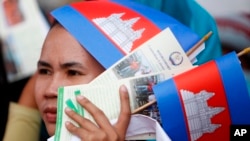U.S.-based Human Rights Watch and U.K.-based ARTICLE 19 on Wednesday said the draft of the Access to Information law, which will soon head to parliament, had many ambiguous provisions and unclear definitions, diluting the intent of the legislation.
The two rights groups released a statement on Wednesday pointing out that despite a lengthy four-year long process, involving multiple consultations, the government had not amended the draft to reflect requests to strengthen the law, especially in light of lax protections for freedom of expression in Cambodia.
The law is expected to make the mostly opaque workings of the government more accessible to rights groups, journalists and Cambodian citizens. But questions have lingered over the strength of the law, as well as if it will be implemented fairly by the Hun Sen government.
“A strong law could open up channels for combating corruption, promoting accountability, and enabling public participation in official decision-making processes,” said Matthew Bugher, Head of Asia Program for ARTICLE 19, a group that advocates for freedom of expression.
The rights groups specifically pointed to the narrow and ambiguous definitions for information that should be disclosed, lack of explicit reference to the law encompassing bodies like the judiciary and failure to define “public interest,” among others.
Ministry of Information spokesperson Meas Sophorn dismissed the critique of the draft law from the two rights groups, pointing instead to an endorsement by United Nations Educational, Scientific and Cultural Organization (UNESCO), which had aided in the drafting process.
“This law is recognized by UNESCO in Cambodia as an open law with a standard and a model for the countries in the region to follow,” he said.
He added that the only discussions occurring around the draft were with the Ministry of Justice on the scope of punitive fines to be included in the law.
UNESCO Country representative Sardar Umar Alam said that the consultative process was ongoing and that Information Ministry should take into account ARTICLE 19’s concerns, like any other stakeholder’s suggestions.
He did not comment on Meas Sophorn’s claim about the UN body’s endorsement for the draft law.
“As far as there is any gaps in the law, we will provide them with technical assistance so that they can address it,” he said.
Phil Robertson, with Human Rights Watch, said that after such a long drafting process, it was incumbent on stakeholders to push the government to improve the law before it is passed by parliament.
“UNESCO, foreign governments, and donors should insist that Prime Minister Hun Sen’s government revises the draft law to bring it into line with international standards,” said Robertson, who is the deputy Asia director for the rights group.
Nop Vy, media director at the Cambodian Center for Independent Media, said that while concerns remained over legislation itself, there was skepticism over the government’s implementation of the law.
“The main thing that we are concerned about is the use of this law, whether it will be used effectively or not,” he said.




